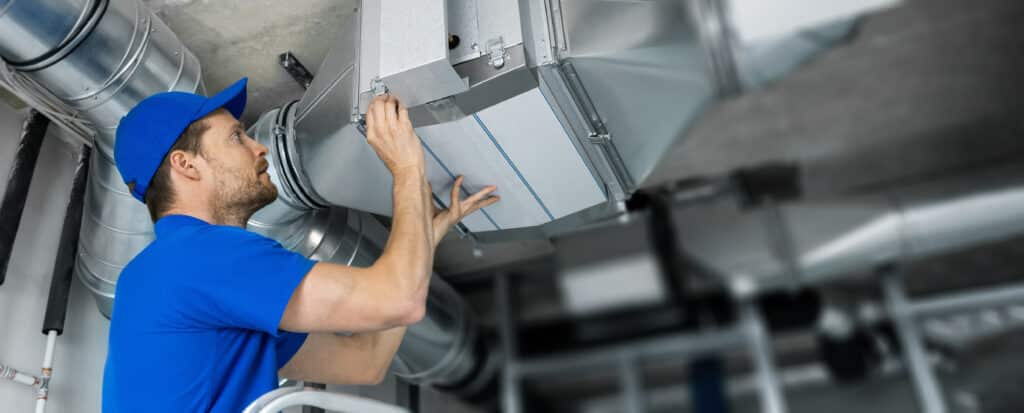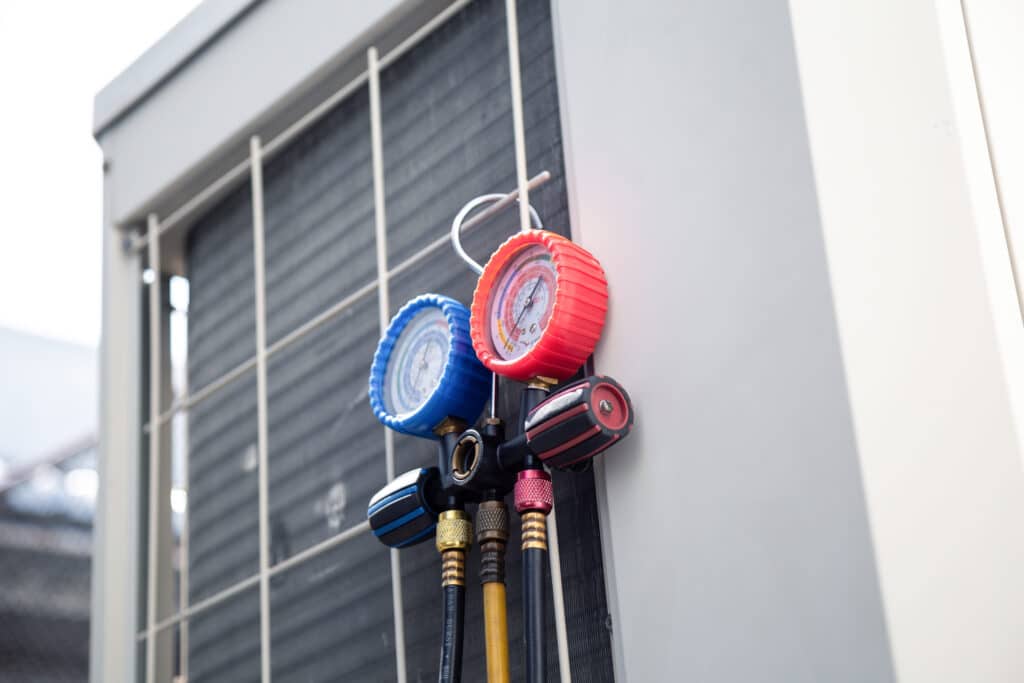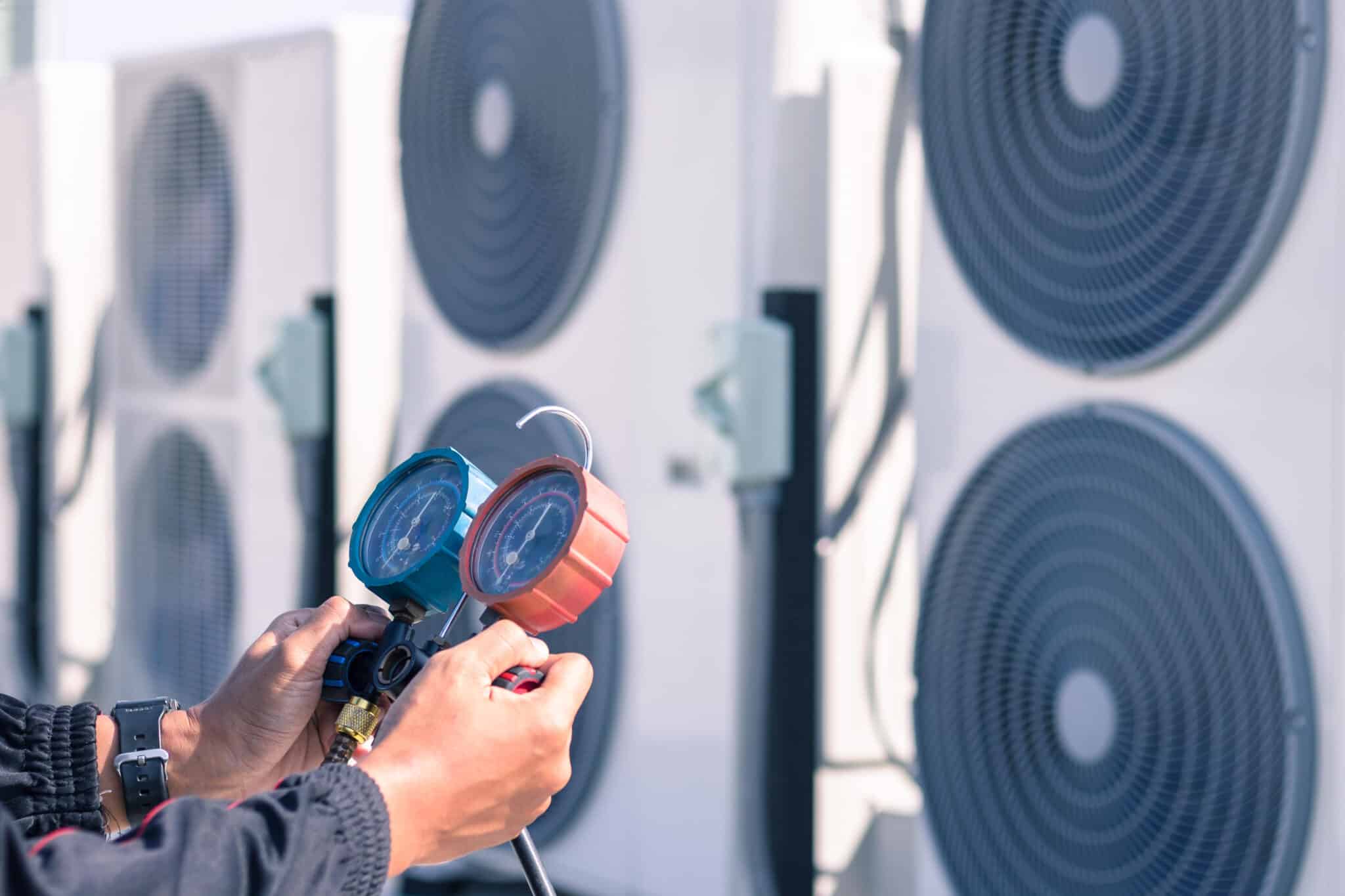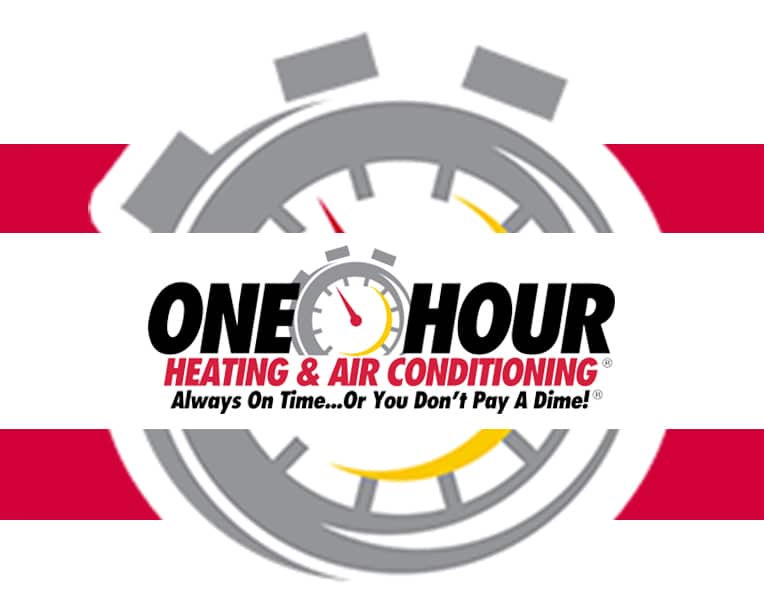Is your business experiencing fluctuating temperatures or unexpected HVAC system failures? A commercial HVAC maintenance plan could be the solution you need to ensure a comfortable and efficient working environment.
In today’s blog, we’ll delve into the numerous benefits of having a structured maintenance plan for your commercial HVAC systems. From improving energy efficiency to extending the lifespan of your equipment, there are compelling reasons to consider investing in regular HVAC maintenance. Keep reading to discover why a commercial HVAC maintenance plan is essential for your business.
What is a Commercial HVAC Maintenance Plan?
A Commercial HVAC Maintenance Plan is a pre-arranged service agreement between a business and an HVAC service provider. This plan ensures that the heating, ventilation, and air conditioning systems within commercial properties are regularly inspected, maintained, and serviced. These plans are designed to keep HVAC systems running efficiently, reduce the likelihood of unexpected breakdowns, and extend the lifespan of the equipment.
Importance for Business Operations
For businesses in La Mesa, CA, and San Diego, CA, a well-functioning HVAC system is crucial. It ensures that employees work in a comfortable environment, which can boost productivity.
Additionally, it helps maintain a pleasant atmosphere for clients and customers, which is vital for businesses like restaurants, retail stores, and offices. By investing in a commercial HVAC maintenance plan, businesses can avoid disruptions caused by HVAC failures and maintain a stable and inviting environment.
Key Components of a Maintenance Plan
Regular Maintenance Visits: Regular maintenance visits are the cornerstone of any commercial HVAC maintenance plan. These visits typically occur quarterly or bi-annually, depending on the specific needs of the business. During these visits, technicians perform a comprehensive check of the HVAC system, cleaning and inspecting all components to ensure everything is in optimal condition.
Emergency Service Coverage: One of the significant benefits of a commercial HVAC maintenance plan is access to emergency services. HVAC systems can sometimes fail unexpectedly, causing significant disruption to business operations. A maintenance plan often includes priority service and reduced rates for emergency repairs, ensuring that any issues are promptly addressed.
Parts and Supplies Included: A comprehensive commercial HVAC maintenance plan usually includes parts and supplies necessary for routine maintenance. This means businesses do not have to worry about additional costs for filters, belts, and other small components that may need regular replacement.
Cost and Billing Details: Commercial HVAC maintenance plans typically offer predictable billing, which can help businesses manage their budgets more effectively. Instead of facing large, unexpected repair bills, businesses pay a regular fee that covers all maintenance services. This consistent expense is easier to plan for and manage, providing financial stability.

Benefits of a Commercial HVAC Maintenance Plan
Improved Energy Efficiency
One of the primary benefits of a commercial HVAC maintenance plan is improved energy efficiency. Regular maintenance ensures that all components of the HVAC system are clean and functioning correctly, which helps the system run more efficiently.
Clean filters, coils, and other components reduce the strain on the HVAC system, allowing it to operate with less effort and energy consumption.
This can lead to significant savings on energy bills, as a well-maintained system uses less energy to heat or cool a space. In the long run, improved energy efficiency also contributes to a reduced carbon footprint, supporting environmental sustainability efforts.
Extended Equipment Lifespan
Routine maintenance can significantly extend the lifespan of HVAC equipment. By addressing small issues before they become major problems, a commercial HVAC maintenance plan helps ensure that the system lasts longer.
Regular inspections and timely repairs prevent minor issues from escalating into serious damage that can compromise the entire system. This means businesses can avoid the high costs associated with replacing HVAC equipment prematurely.
An HVAC maintenance plan ensures that businesses get the most out of their investment, allowing them to focus on other critical areas of operation without worrying about unexpected HVAC replacements.
Reduced Risk of Breakdowns
Unexpected HVAC breakdowns can be costly and disruptive to business operations. Regular maintenance helps identify and fix potential issues before they cause a system failure.
This proactive approach reduces the risk of unexpected breakdowns, ensuring that business operations can continue smoothly. Minimizing downtime is crucial to maintaining productivity and customer satisfaction.
A commercial HVAC maintenance plan provides peace of mind, knowing that the HVAC system is less likely to fail unexpectedly, allowing businesses to operate without interruption.
Consistent Comfort Levels
A well-maintained HVAC system provides consistent heating and cooling, creating a comfortable environment for employees and customers. This consistency is essential for maintaining productivity and ensuring customer satisfaction.
Employees working in a comfortable environment are likely to be more productive and have higher morale. Similarly, customers who experience a pleasant atmosphere are more likely to return and engage with the business. A commercial HVAC maintenance plan ensures that temperature and air quality are consistently optimal, contributing to a positive experience for everyone in the building.
Improved Indoor Air Quality
HVAC systems play a crucial role in maintaining indoor air quality. Regular maintenance includes cleaning and replacing air filters, which help remove dust, allergens, and other contaminants from the air. This leads to a healthier indoor environment, which can reduce employee sick days and improve overall well-being.
In areas where outdoor air quality can vary, having a robust indoor air quality system is essential. A commercial HVAC maintenance plan ensures that air filters and other components are regularly serviced, providing clean and healthy air for all building occupants.
Compliance with Regulations
In many areas, there are specific regulations regarding HVAC system maintenance and efficiency. A commercial HVAC maintenance plan ensures that businesses comply with these regulations, avoiding potential fines and penalties. Compliance with local, state, and federal regulations is critical for legal and financial reasons.
Regular maintenance helps businesses stay up-to-date with required standards, preventing legal issues and maintaining a good reputation. An HVAC maintenance plan provides the necessary documentation and assurance that the system meets all regulatory requirements.
Better System Performance
Regular maintenance helps ensure that the HVAC system is performing at its best. Technicians can calibrate and adjust the system to optimize performance, ensuring that it provides effective heating and cooling throughout the year.
This includes fine-tuning components, balancing airflow, and making necessary adjustments to maintain peak efficiency.
Better system performance not only enhances comfort levels but also ensures that the HVAC system can handle varying loads and weather conditions. A plan keeps the system running smoothly, providing reliable performance when it is needed the most.
Financial Savings
While there is a cost associated with a commercial HVAC maintenance plan, the financial savings can be substantial. Reduced energy bills, fewer repair costs, and extended equipment lifespan all contribute to significant cost savings over time.
Additionally, avoiding unexpected breakdowns can prevent costly downtime and lost revenue. These savings can be reinvested into other critical areas, such as marketing, employee training, or facility improvements. An HVAC maintenance plan offers a cost-effective solution for managing HVAC systems, ensuring that businesses operate efficiently and economically.

Typical Services Included in a Maintenance Plan
Inspection and Cleaning of Components: Regular inspection and cleaning of HVAC components are essential to maintain efficiency and performance. Technicians will clean coils, filters, and other parts, ensuring that the system operates smoothly and efficiently.
Lubrication of Moving Parts: Moving parts within the HVAC system, such as motors and fans, require regular lubrication to prevent wear and tear. This service helps extend the lifespan of these components and ensures that the system runs quietly and efficiently.
Refrigerant Level Checks: Maintaining the correct refrigerant levels is crucial for the efficient operation of an HVAC system. Technicians will check and adjust refrigerant levels as part of the maintenance plan, ensuring that the system can effectively cool the space.
Electrical System Inspections: Electrical issues are a common cause of HVAC system failures. Regular inspections of the electrical components, including wiring and connections, help identify potential problems before they cause a breakdown.
System Performance Testing: Performance testing involves checking the overall operation of the HVAC system to ensure it is running at peak efficiency. Technicians will test various aspects of the system, including airflow, temperature control, and system responsiveness.
Customizing Your Maintenance Plan
Tailoring Services to Specific Needs
Every business has unique HVAC needs, and a commercial HVAC maintenance plan can be customized to meet those specific requirements. For instance, a business operating a large office building will have different HVAC needs compared to a restaurant or a manufacturing facility.
Customization involves understanding the specific demands of the business environment and creating a plan that addresses those needs effectively. Customizing a commercial HVAC maintenance plan ensures that each aspect of the system is maintained according to the business’s unique requirements, resulting in better performance and efficiency.
Seasonal Adjustments and Considerations
HVAC needs can vary depending on the season, even in San Diego, CA. A customized maintenance plan should include seasonal adjustments to ensure year-round efficiency and comfort.
- Summer Adjustments: Focus on cooling components by checking refrigerant levels, cleaning coils, and preparing air conditioning units for high temperatures.
- Winter Adjustments: Prioritize heating elements by inspecting boilers, checking furnace components, and ensuring adequate heating.
- Spring and Fall Tune-Ups: Use these transitional periods for comprehensive system checks. Spring tune-ups should prepare the cooling system, while fall tune-ups ready the heating system.
Incorporating these seasonal adjustments helps maintain optimal HVAC performance and consistent comfort throughout the year.
How Regular Maintenance Prevents Major Repairs
Early Detection of Issues
One of the key benefits of regular maintenance is the early detection of potential issues. Technicians can identify and address small problems before they escalate into major repairs. This proactive approach helps prevent costly breakdowns and extends the lifespan of the HVAC system.
- Inspection of Components: Regular inspections can reveal wear and tear on components that, if left unchecked, could lead to significant damage. For example, a small leak in a refrigerant line can be fixed before it depletes the system’s refrigerant and causes the compressor to fail.
- Monitoring System Performance: Technicians use diagnostic tools to monitor system performance and efficiency. This allows them to spot abnormalities that could indicate potential issues, such as uneven airflow or unusual noises.
Early detection of issues through regular maintenance minimizes the risk of unexpected breakdowns, ensuring that the HVAC system operates reliably.
Preventive Measures and Repairs
Regular maintenance includes preventive measures that help avoid common HVAC problems. Preventive maintenance is designed to keep the system running smoothly and reduce the risk of major repairs.
- Cleaning and Replacing Air Filters: Regular cleaning and replacement of air filters prevent airflow issues and maintain good indoor air quality. Dirty filters can restrict airflow, causing the system to work harder and potentially overheat.
- Lubricating Moving Parts: Lubrication reduces friction and wear on moving parts such as motors and fans, extending their lifespan and preventing premature failures.
- Checking Electrical Connections: Ensuring that all electrical connections are tight and secure helps prevent electrical issues that could cause system malfunctions or pose safety hazards.
By incorporating these preventive measures into a commercial HVAC maintenance plan, businesses can significantly reduce the likelihood of major repairs and extend the life of their HVAC systems.
Selecting the Right HVAC Maintenance Provider
Credentials and Experience
Choosing the right HVAC maintenance provider is crucial for ensuring high-quality service. Look for providers with the necessary credentials and experience in commercial HVAC systems. This includes certifications, licenses, and a proven track record of reliable service.
Certifications and Licenses: Ensure that the provider has the appropriate certifications from recognized industry organizations, such as NATE (North American Technician Excellence) or HVAC Excellence. These certifications indicate that the technicians have received proper training and adhere to industry standards.
Proven Track Record: Experience matters in HVAC maintenance. Look for providers with a history of successful maintenance projects and positive customer reviews. This demonstrates their ability to deliver consistent and reliable service.
Specialized Knowledge: Commercial HVAC systems can be complex, and it is important to choose a provider with expertise in handling the specific type of system used by your business. This ensures that they are familiar with the unique challenges and maintenance needs of your system.
Service Guarantees and Support
A reputable HVAC maintenance provider offers service guarantees and robust support, including guarantees on parts and labor and 24/7 emergency repair services. These guarantees ensure that repairs and maintenance are covered for a specific period, providing confidence in the quality of work.
Access to 24/7 emergency services is essential for businesses to minimize downtime and promptly address issues. Additionally, excellent customer service is crucial; the provider should be easy to contact, responsive to inquiries, and proactive in scheduling maintenance visits and addressing concerns.
Comprehensive support from the provider ensures that businesses can rely on their HVAC systems to operate smoothly and efficiently.
Keep Your Business Comfortable with One Hour Heating & Air Conditioning of San Diego
Maintaining a comfortable and efficient working environment is crucial for the success of any business. Investing in a commercial HVAC maintenance plan can provide numerous benefits, from improved energy efficiency to reduced risk of breakdowns.
At One Hour Heating & Air Conditioning of San Diego, we offer comprehensive maintenance plans tailored to meet the unique needs of businesses in La Mesa, CA, and San Diego, CA.
Our experienced technicians provide thorough inspections, regular maintenance, and emergency services to ensure your HVAC system operates at its best. Contact us today to learn more about our commercial HVAC maintenance plans and how we can help keep your business comfortable and efficient.
Frequently Asked Questions
How often should commercial HVAC systems be serviced?
Commercial HVAC systems should typically be serviced at least twice a year. However, the frequency can vary depending on the specific needs of the business and the HVAC system. Regular maintenance visits, usually scheduled quarterly or bi-annually, help ensure the system operates efficiently and reliably.
What is included in a typical maintenance visit?
A typical maintenance visit includes a comprehensive inspection and cleaning of the HVAC system. This includes checking refrigerant levels, lubricating moving parts, inspecting electrical components, and testing system performance. The visit may also include replacing filters and other small components as needed.
How do maintenance plans affect energy efficiency?
Maintenance plans have a significant impact on energy efficiency. Regular maintenance ensures that all components of the HVAC system are clean and functioning correctly, which helps the system operate more efficiently. This can lead to substantial savings on energy bills, as a well-maintained system uses less energy to heat or cool a space.
Can maintenance plans be customized?
Yes, commercial HVAC maintenance plans can be customized to meet the specific needs of a business. This includes tailoring the frequency of maintenance visits, selecting specific services, and making seasonal adjustments. A customized plan ensures that the HVAC system receives the necessary care to operate efficiently and reliably.
What are the signs that my commercial HVAC system needs maintenance?
There are several signs that your commercial HVAC system may need maintenance. These include unusual noises, inconsistent temperatures, increased energy bills, and poor indoor air quality. If you notice any of these issues, it is essential to schedule a maintenance visit to address potential problems before they escalate into more significant issues. A commercial HVAC maintenance plan can help identify and resolve these issues promptly.



















